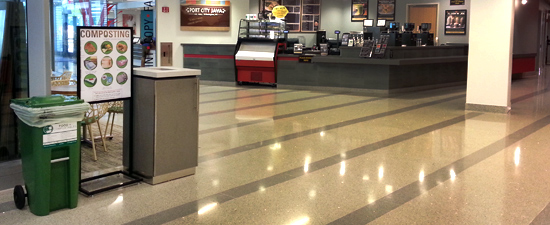Talley Student Union implements post-consumer composting


NC State’s Talley Student Union will pilot two post-consumer composting stations this fall, making it the first building on the university’s campus to provide such a service.
Students, faculty and staff dining in Talley will now have the option to place their leftovers and compostable items into a compost bin rather than a landfill bin. The post-consumer compost bins will be located next to the current waste station outside of One Earth and directly across from Port City Java. Additionally, Rave! Event Services will incorporate composting into their operations at Talley Student Union.
Many of the restaurants at Talley, which are all operated by University Dining, use compostable products such as plates, clamshells and napkins.
“Composting at Talley has always been part of the plan as we seek LEED certification of the new Talley Student Union, in addition to our ongoing commitment to divert waste from the landfill,” said Dr. TJ Willis, associate director of University Student Centers.
Up to 31 percent of the U.S. food supply is wasted every year, according to the United States Department of Agriculture. That means 133 billion pounds of uneaten food typically ends up in landfills where it rots and produces methane, a harmful greenhouse gas. Rather than ending up in the landfill, compost collected from Talley will be transported to Brooks Contractor Composting Facility with other food waste and compostables collected on campus such as pre-consumer dining hall waste, waste from special events and pizza boxes from University Housing’s composting project.
Since 2010, NC State’s three dining halls have diverted more than 1,348 tons from the landfill through composting and added an anaerobic digester (which liquefies food waste) to its largest dining hall during a dishwashing room renovation in 2013.
“Education will be a key component to the success of this pilot,” said Analis Fulghum, program manager for Waste Reduction and Recycling. “We plan to work with the campus community to raise awareness of how to compost effectively and determine if it’s feasible to expand post-consumer collection into other buildings on campus.”
The Waste Reduction and Recycling Office credits Campus Enterprises — which comprises University Dining, University Student Centers and Rave! Event Services as well as the other retail and hospitality services on campus — in helping to further composting efforts for campus.
“We are excited to work with our campus partners to implement this program and look forward to the campus community joining this partnership to make post-consumer composting a success,” Willis said.
- Categories: